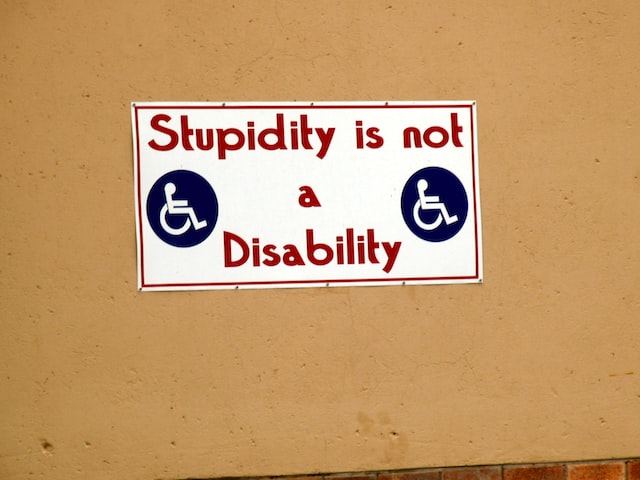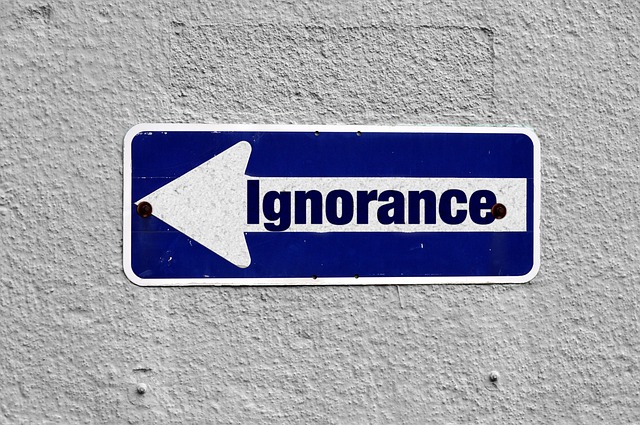Stupid people are considered to be unwise or foolish due to their lack of knowledge, whereas ignorant people simply lack knowledge. Both can be corrected with education and experience; however, neither should be taken lightly as they can both lead to poor decisions. Understanding this distinction can help us better recognize these behaviors in ourselves and others so we can take steps towards a more informed state of being.
What is ignorance and stupidity?
(Image by Steve Buissinne from Pixabay )

Ignorance is the lack of knowledge or awareness about something. It can be used to describe a person who is unaware of something, or a situation in which someone is uninformed about something. Ignorance can also be used to describe a lack of understanding about a particular topic.
There is no single definition of stupidity, but it can generally be described as a lack of intelligence, understanding, or common sense. Ignorance, on the other hand, is simply a lack of knowledge. While ignorance can lead to stupid decisions, it is not the same thing as stupidity.
A person can be ignorant of the law and still not be considered stupid. Likewise, a person can be ignorant of facts and yet not be considered stupid. The line between ignorance and stupidity is often blurred, but there are some key differences.
For one, ignorance can be cured through education. A person who is ignorant of the law can learn about it and become knowledgeable. A person who is ignorant of facts can also learn about them and become knowledgeable. However, there is no “cure” for stupidity. Once a person lacks intelligence or common sense, they cannot gain it back.
Secondly, ignorance is often unintentional. A person may be unaware of something because they have never been exposed to it before. Stupidity, on the other hand, is often deliberate. A person may make a foolish decision because they do not understand the consequences or because they do not care about the consequences.
Lastly, people are often more forgiving of ignorance than they are of stupidity. This is because ignorance can be seen as an honest mistake whereas stupidity is seen as a lack of effort or judgment.
What is the difference between stupidity and ignorance?
It is often said that there is no difference between stupidity and ignorance. However, there is a big difference between the two. Ignorance is when someone lacks knowledge about something. stupidity is when someone knows about something but chooses to ignore it or act in a way that goes against what they know.
For example, pretend you are trying to learn how to play the guitar. You may be ignorant of how to play at first, but if you keep practicing and learning, you will eventually get better. On the other hand, if you know how to play the guitar but choose to never practice or put in the effort to improve, then you can be considered stupid.
Ignorance refers to a lack of knowledge or information about a particular subject. It is a passive state, meaning that a person is simply unaware of something. Ignorance can be corrected through education and learning.
Stupidity, on the other hand, refers to a lack of intelligence or ability to learn. It is an active state, meaning that a person actively makes poor decisions or does not use their intelligence to its fullest potential. Stupidity is not necessarily related to a lack of information or knowledge, but rather a lack of critical thinking skills or common sense.
Ignorance is a lack of knowledge or information, while stupidity is a lack of intelligence or ability to learn. Ignorance can be corrected through education, but stupidity is more related to an individual’s inherent cognitive abilities.
The dangers of being stupid
Being stupid can lead to a number of dangers and negative consequences. Here are a few examples:
- Poor Decision Making: Stupidity often leads to poor decision-making, which can have negative consequences in all aspects of life. People who are not able to think critically may make choices that are not in their best interest or that harm themselves or others.
- Vulnerability to Scams: People who lack intelligence or critical thinking skills may be more vulnerable to scams and frauds. They may not be able to recognize red flags or evaluate the legitimacy of an offer, leading to financial or personal harm.
- Health Risks: Stupidity can lead to risky behavior, such as drug use, binge drinking, or reckless driving, which can put a person’s health and safety at risk.
- Inability to Learn: Stupidity can also make it difficult for a person to learn and improve their skills and knowledge. Without the ability to learn, a person may be stuck in a job or situation that is not fulfilling or not be able to adapt to new challenges and opportunities.
- Social Isolation: People who lack intelligence or critical thinking skills may have difficulty connecting with others and building meaningful relationships. This can lead to social isolation and a lack of support, which can further contribute to negative consequences in other areas of life.
Being stupid can have a range of negative consequences and dangers, from poor decision-making to health risks and social isolation. It is important for individuals to continually develop their cognitive abilities and critical thinking skills to mitigate these risks and lead a fulfilling life.
The dangers of being ignorant
Being ignorant can also have a number of negative consequences and dangers. Here are a few examples:
- Misunderstanding: Ignorance can lead to a lack of understanding about important issues, such as politics, economics, and social issues. This can lead to prejudice, bias, and stereotypes, which can harm individuals and society as a whole.
- Missed Opportunities: Ignorance can also cause individuals to miss opportunities in life. For example, a lack of knowledge about available resources or job opportunities can prevent individuals from advancing in their careers or improving their financial situation.
- Health Risks: Ignorance can also contribute to health risks, such as a lack of knowledge about healthy eating or exercise habits. This can lead to obesity, heart disease, and other health problems.
- Poor Decision Making: Similar to stupidity, ignorance can lead to poor decision making. Individuals who lack knowledge about a particular subject may make choices that are not in their best interest or that harm themselves or others.
- Dependence on Others: Ignorance can also make individuals more dependent on others. For example, a lack of knowledge about financial management can prevent individuals from being able to manage their own finances and can lead to financial dependence on others.
Being ignorant can have a range of negative consequences, from misunderstanding important issues to missed opportunities and health risks. It is important for individuals to continually educate themselves and seek out knowledge to mitigate these risks and lead a fulfilling life.
Is stupidity and ignorance a medical condition?
(Photo by R. du Plessis on Unsplash )

It is a common misconception that stupidity and ignorance are medical conditions. This is not the case; however, there are some similarities between the two. Both stupidity and ignorance can be characterized by a lack of understanding or knowledge. Ignorance is often used to describe someone who is unaware of something, while stupidity refers to someone who is unable to understand something.
Stupidity is often seen as a form of intellectual disability, where a person has difficulty learning or comprehending new information. On the other hand, ignorance can simply be a result of not having been exposed to certain ideas or information. It is important to note that ignorance is not necessarily permanent; someone can become ignorant of something if they were never taught about it in the first place.
In general, stupidity is considered to be more serious than ignorance. This is because stupidity implies a lack of intelligence that cannot be helped, whereas ignorance can often be remedied through education or exposure to new information.
How to identify stupidity in oneself?
There is a big difference between stupidity and ignorance. Ignorance is simply not knowing something. Stupidity, on the other hand, is a lack of intelligence or common sense. It’s important to be able to identify stupidity in oneself so that one can avoid it.
There are a few key ways to identify stupidity in oneself:
- Actions that consistently result in negative outcomes despite being warned against them
- A complete lack of self-awareness
- An inability or unwillingness to learn from mistakes
- A refusal to accept responsibility for one’s actions
- Engaging in risky or dangerous behavior without any regard for the consequences
If you find yourself engaging in any of the above behaviors, it’s important to take a step back and examine why you’re doing it. It could be indicative of a larger problem that needs to be addressed.
How to identify ignorance in oneself?
So how can you tell if you’re being ignorant? Here are some signs:
- You’re resistant to new information or ideas.
- You think you know everything already.
- You’re close-minded and inflexible.
- You’re unwilling to change your beliefs, even when presented with evidence to the contrary.
- You insist on being right, even when you’re clearly wrong.
If any of these sound familiar, then it’s time to take a good hard look at yourself and start opening your mind. Remember, ignorance is not necessarily a bad thing; but refusing to learn is definitely harmful to your growth as a person.
How to overcome stupidity and ignorance?
This is a question that has been asked throughout history. It’s a difficult question to answer because there are many factors to consider. Is someone who is uneducated ignorant or simply stupid? Does intelligence play a role in ignorance?
There are a few ways to look at this question. One way is to consider the Dunning-Kruger effect. This theory suggests that people who are incompetent are often unaware of their own incompetence. They lack the ability to accurately assess their own skill level and as a result, they overestimate their abilities. This can lead them to make poor decisions due to their overconfidence.
people who are uninformed about a certain topic can be considered ignorant on that topic. However, this doesn’t mean that they’re unintelligent overall. They just haven’t had the opportunity to learn about the topic in question. In some cases, people may be too lazy to seek out information and this could be considered a form of ignorance.
So, how can you overcome stupidity and ignorance? Well, it depends on what you define as these terms. If you believe that intelligence is a key factor, then you may want to consider taking steps to improve your own cognitive abilities. This could involve things like learning new skills, reading challenging books, and exercising your brain regularly.
If you believe that laziness is a key factor in ignorance, then you may want to try and motivate yourself to seek out knowledge.
Featured Image By – Image by Gerd Altmann from Pixabay








